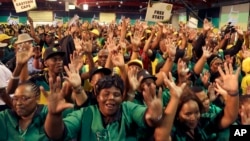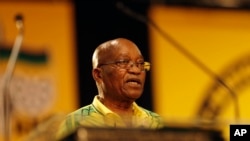South Africa’s embattled president made no attempt to hide his pick for his successor as his party met to vote over new leadership, delivering several backhands at his deputy, successful businessman Cyril Ramaphosa.
“We cannot exercise things that are foreign to ANC culture and tendencies,” Jacob Zuma said to the gathering, in Soweto, of some 5,000 delegates of the African National Congress, who greeted his arrival with half-hearted applause.
He warned delegates, who will vote Saturday and Sunday, to avoid results that would be “seen to be beneficial to business,” saying such an outcome might cause the ruling party to “implode.”
Zuma also lashed out at the media for having a “vested interest” in harming the ANC. The claim drew scattered applause from the floor.
“We need to reflect on how to communicate with our people in a climate in which the forces hostile to the ANC control the means to access to platforms of communications,” he said.
Zuma, whose mounting corruption scandals have deeply divided the party, will step down as party leader at this conference, as his term ends. His successor will then be the presumptive ruling party presidential candidate when South Africa next votes, in 2019. Zuma may continue as president of the country after the vote, but analysts also predict his party will try to convince him to step out of the role before elections.
Behind the president sat Zuma’s favored pick: Nkosazana Dlamini-Zuma, a top diplomat and former minister who is also Zuma’s former wife. She and Ramaphosa are the two top candidates, but others may emerge.
Voting is going to be a complicated, contentious process — on Saturday, party secretary Gwede Mantashe told journalists the party had ruled that some 100 delegates affected by three court rulings on Friday will not be granted voting status at the conference.
That could be seen as a blow to Dlamini-Zuma’s base.
Zuma urged his party to maintain a united front, as did other prominent members of the party and a slew of religious leaders, who delivered an impassioned, emotional call for peace and unity as the conference began. The last year has seen dramatic blowups at ANC events, including a chair-throwing bonanza at a provincial-level meeting in October.
“Our people are frustrated when we spend more time fighting amongst ourselves than solving the day-to-day challenges that they experience," said Zuma. “Factionalism has become the biggest threat to the organization.”
Many political watchers, like former Gauteng province premier Tokyo Sexwale, have warned that this bitter battle could make or break the party that has commanded a clean majority in every national vote since 1994.
“At this conference it is at the crossroads,” Sexwale told VOA on the conference sidelines. “It must be mindful of the fact that a wrong turn could bury this organization.”
“Here’s a chance now to fix the ANC itself,” he said. “...To send a strong message that we have turned a corner. If we are not going to do that, nobody is going to trust us.”





